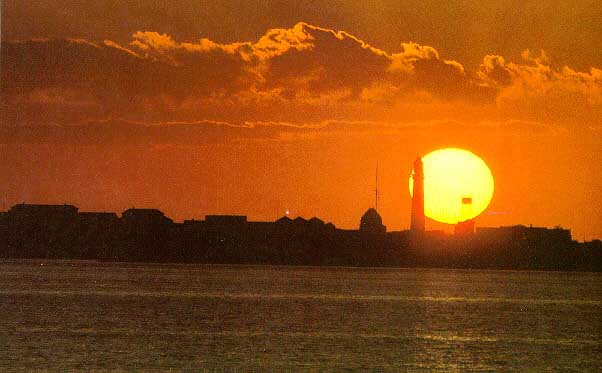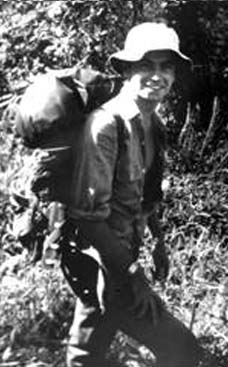2007.11.11: November 11, 2007: Headlines: COS - Pakistan: Figures: COS - Morocco: Journalism: Newsday: James Rupert writes: Pakistan's weaknesses, nuclear arms pose threat
Peace Corps Online:
Directory:
Pakistan:
Peace Corps Pakistan :
Peace Corps Pakistan: Newest Stories:
2007.11.11: November 11, 2007: Headlines: COS - Pakistan: Figures: COS - Morocco: Journalism: Newsday: James Rupert writes: Pakistan's weaknesses, nuclear arms pose threat
James Rupert writes: Pakistan's weaknesses, nuclear arms pose threat

Unlike other problem states -- Sudan, Iraq, Somalia, etc. -- Pakistan is a heavyweight. It's the sixth-most populous country, and one of only eight or nine with nuclear weapons. Increasingly, it also is home base to al-Qaida, the Taliban and allied Islamic militant groups. If al-Qaida someday gets an atomic bomb, or a radioactive "dirty bomb" with which to attack the U.S., many specialists say, a likely source will be Pakistan. Journalist James Rupert, head of Newsday's international bureau in Islamabad, Pakistan began his career abroad as a Peace Corps volunteer, teaching mechanics and welding in Morocco.
James Rupert writes: Pakistan's weaknesses, nuclear arms pose threat
Pakistan's weaknesses, nuclear arms pose threat
BY JAMES RUPERT | james.rupert@newsday.com
November 11, 2007
ISLAMABAD, Pakistan - Why all the fuss about Pakistan?
Each year since 2002, the U.S. government has poured nearly $2 billion into this land a hemisphere away -- roughly half what it spent this year for its entire cancer institute budget and about what it spent on the international space station.
And as Pakistan slid into crisis this year, commentators as disparate as Newsweek, Senate Foreign Relations Committee chairman Joseph Biden (D-Del.) and London's daily Telegraph declared it the "most dangerous" country in the world.
The "Pakistan problem" is basically that it's a weak state with strong weapons. Foreign Policy magazine, which evaluates countries annually to judge which could easily fall apart, put Pakistan near the top of its list this year -- 12th out of 177.
In a more tightly knit world, "the threats of weak states ... ripple far beyond their borders and endanger the development and security of [even rich and powerful] nations," Foreign Policy wrote.
Unlike other problem states -- Sudan, Iraq, Somalia, etc. -- Pakistan is a heavyweight. It's the sixth-most populous country, and one of only eight or nine with nuclear weapons. Increasingly, it also is home base to al-Qaida, the Taliban and allied Islamic militant groups. If al-Qaida someday gets an atomic bomb, or a radioactive "dirty bomb" with which to attack the U.S., many specialists say, a likely source will be Pakistan.
Here are some basic questions about Pakistan:
Why is Pakistan supposedly such a fragile state?
Pakistan is a 60-year-old experiment, a religious homeland for Muslims who were vastly outnumbered by India's Hindus. Comprising more than a dozen major or minor ethnic groups, neither ethnicity nor language unifies this country.
As in many ethnically varied countries, the constitution promises a federal state that gives the diverse provinces a real share of power. But a small elite, largely military and mainly from Punjab province, has concentrated power in its hands. Also, Pakistan is deeply corrupt (ranking 138th out of 180 countries in the latest index by the watchdog group Transparency International). So much government money is siphoned away -- notably by the ruling military, according to researcher Ayesha Siddiqua -- that many state systems, such as schools, simply don't work. Barely half of Pakistanis can read.
Why is it said that Pakistan's nuclear program is particularly dangerous?
Pakistan actually long had two nuclear programs, one run by the flamboyant scientist Abdul Qadir Khan. The U. S. forced President Pervez Musharraf to arrest Khan in 2004 after he arranged the sale of nuclear bombmaking technology to Libya and North Korea. Musharraf claims Khan ran that operation on his own, but it was so large investigators believe senior Pakistani officials must have been involved.
Also, one of Khan's associates is a Taliban ally who reportedly met with Osama bin Laden as the al-Qaida chief was seeking nuclear or chemical weapons in August 2001. Pakistan has barred anyone from talking with Khan while he is under house arrest. It's feared some old colleagues might be ready to sell nuclear know-how.
Pakistan's nuclear weapons seem more secure. The army entrusts its bombs to a unit called the Strategic Plans Division, whose commander has been praised by U.S. nuclear security specialists.
Why is Islamic militancy so strong? Could militants take over the government?
Islamic religious parties tend to win less than 10 percent in most Pakistani elections, so they won't form an elected government anytime soon.
But authors like Harvard University researcher Hassan Abbas note that, for years, Pakistani rulers routinely have whipped up Islamic religious fervor to rally people behind them, and that sometimes gives militants exaggerated power. Independent observers say Musharraf tilted the 2002 elections toward religious parties (because he needed their support against the big secular parties that opposed his military rule).
Because the weak, corrupt government and police can't control remote areas, al-Qaida and the Taliban are free to build local fiefdoms through their armed strength, their money and their ability to influence a largely illiterate population.
And the militants have sympathizers in the military. Musharraf has purged many. Still, militants in the military help the Taliban fight U.S. troops and, in 2004, enabled suicide bombers to almost kill Musharraf.
Links to Related Topics (Tags):
Headlines: November, 2007; RPCV James Rupert (Morocco); Peace Corps Pakistan; Directory of Pakistan RPCVs; Messages and Announcements for Pakistan RPCVs; Figures; Peace Corps Morocco; Directory of Morocco RPCVs; Messages and Announcements for Morocco RPCVs; Journalism
When this story was posted in December 2007, this was on the front page of PCOL:





Peace Corps Online The Independent News Forum serving Returned Peace Corps Volunteers 
 | Dodd vows to filibuster Surveillance Act
Senator Chris Dodd vowed to filibuster the Foreign Intelligence Surveillance Act that would grant retroactive immunity to telecommunications companies that helped this administration violate the civil liberties of Americans. "It is time to say: No more. No more trampling on our Constitution. No more excusing those who violate the rule of law. These are fundamental, basic, eternal principles. They have been around, some of them, for as long as the Magna Carta. They are enduring. What they are not is temporary. And what we do not do in a time where our country is at risk is abandon them." |
 | What is the greatest threat facing us now?
"People will say it's terrorism. But are there any terrorists in the world who can change the American way of life or our political system? No. Can they knock down a building? Yes. Can they kill somebody? Yes. But can they change us? No. Only we can change ourselves. So what is the great threat we are facing? I would approach this differently, in almost Marshall-like terms. What are the great opportunities out there - ones that we can take advantage of?" Read more. |
 | Senator Dodd's Peace Corps Hearings
Read PCOL's executive summary of Senator Chris Dodd's hearings on July 25 on the Peace Corps Volunteer Empowerment Act and why Peace Corps Director Ron Tschetter does not believe the bill would contribute to an improved Peace Corps while four other RPCV witnesses do. Highlights of the hearings included Dodd's questioning of Tschetter on political meetings at Peace Corps Headquarters and the Inspector General's testimony on the re-opening of the Walter Poirier III investigation. |
 | Paul Theroux: Peace Corps Writer
Paul Theroux began by writing about the life he knew in Africa as a Peace Corps Volunteer. His first first three novels are set in Africa and two of his later novels recast his Peace Corps tour as fiction. Read about how Theroux involved himself with rebel politicians, was expelled from Malawi, and how the Peace Corps tried to ruin him financially in John Coyne's analysis and appreciation of one of the greatest American writers of his generation (who also happens to be an RPCV). |
 | Ambassador revokes clearance for PC Director
A post made on PCOL from volunteers in Tanzania alleges that Ambassador Retzer has acted improperly in revoking the country clearance of Country Director Christine Djondo. A statement from Peace Corps' Press Office says that the Peace Corps strongly disagrees with the ambassador’s decision. On June 8 the White House announced that Retzer is being replaced as Ambassador. Latest: Senator Dodd has placed a hold on Mark Green's nomination to be Ambassador to Tanzania. |
 | Suspect confesses in murder of PCV
Search parties in the Philippines discovered the body of Peace Corps Volunteer Julia Campbell near Barangay Batad, Banaue town on April 17. Director Tschetter expressed his sorrow at learning the news. “Julia was a proud member of the Peace Corps family, and she contributed greatly to the lives of Filipino citizens in Donsol, Sorsogon, where she served,” he said. Latest: Suspect Juan Duntugan admits to killing Campbell. Leave your thoughts and condolences . |
 | He served with honor
One year ago, Staff Sgt. Robert J. Paul (RPCV Kenya) carried on an ongoing dialog on this website on the military and the peace corps and his role as a member of a Civil Affairs Team in Iraq and Afghanistan. We have just received a report that Sargeant Paul has been killed by a car bomb in Kabul. Words cannot express our feeling of loss for this tremendous injury to the entire RPCV community. Most of us didn't know him personally but we knew him from his words. Our thoughts go out to his family and friends. He was one of ours and he served with honor. |
Read the stories and leave your comments.

Some postings on Peace Corps Online are provided to the individual members of this group without permission of the copyright owner for the non-profit purposes of criticism, comment, education, scholarship, and research under the "Fair Use" provisions of U.S. Government copyright laws and they may not be distributed further without permission of the copyright owner. Peace Corps Online does not vouch for the accuracy of the content of the postings, which is the sole responsibility of the copyright holder.
Story Source: Newsday
This story has been posted in the following forums: : Headlines; COS - Pakistan; Figures; COS - Morocco; Journalism
PCOL39980
51














